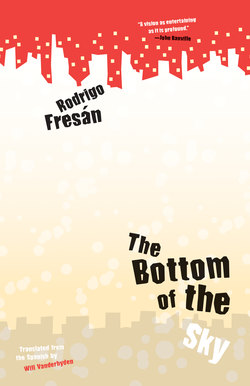Читать книгу Bottom of the Sky - Rodrigo Fresán - Страница 22
На сайте Литреса книга снята с продажи.
ОглавлениеWhat I remember most about my first days in Manhattan are the nights. So different from those of Brooklyn. So much noisier. More alive. Nights that walk and talk in their sleep. It wasn’t like Brooklyn was rural, but compared to the incessant and aggressive electric pulse of the metropolis, Brooklyn’s voice was much closer to a whisper, acoustic and loving.
And the sky of the great city—because it’s at night that we’re most aware of the immensity of space, of its infinite possibilities, as during the day the sun’s blinding presence blots out everything—seemed, to me, to have shaken loose the stars so they fell across an always burning skyline. A city in flames, phosphorescent and trembling with subterranean gasps of subways and moans of elevated trains.
I remember that I could barely sleep, that I heard the voices of nearby skyscrapers as if they were talking to each other in that language of steel and cement that buildings communicate with. There they were, all of a sudden, all those immense skyscrapers, like rockets condemned never to fly, having to settle for being signposts of girders and windows indicating the path to follow. Thinking about it now, from here, from this present, for me, at that time, Manhattan was the future. A science-fiction city. A tomorrow and—once again—an and already was in the present. And there I was—recently landed in Manhattan—like a caveman lost in that space where for me everything was new and at the same time as ancient and primitive as matters of family tend to be. “Family” understood as that thousand-headed organism where stories—situations—repeat themselves over and over with slight variations and dissonances that are surprising at first, but find their original aria before too long. Because inside a family—though it goes unsaid, a deafening silence—nobody hesitates to pinpoint the exact situation of that original and now-dead star whose sickly light still reaches us.
In other words: my father wasn’t the first Goldman—nor will he be the last Leventhal—to go mad. But it was clear that, for me, neither the certainty of a past lunatic nor the possibility of a future madman was any comfort at all.
They stuck my father in a straight jacket, inside a room with padded walls, cursing a nameless creator. And I was alone, far from home, sharing a room with a cousin of exceedingly peculiar habits, who was convinced that our world, as we know it and as it is shown in the history books, wasn’t really ours.
But really—I realized almost right away—Ezra’s ideas, his histrionic poses, the borrowing of revelations written, in letters that looked more printed than handwritten, all the same height, repeating the same curves and straight lines, in the pages of his MANUAL OF A YOUNG SPACE TRAVELER/INSTRUCTIONS FOR HOW TO OPERATE, INTERACT, AND PROSPER ON THIS AND OTHER PLANETS ACCORDING TO THE PRECEPTS OF EZRA LEVENTHAL (REX ARCANA OF THE MILKY WAY), were just my cousin’s way of welcoming me. His way of helping me feel less alone. A way of telling me that he and I belonged to the same rare and privileged species. Because Ezra would say to me the day after my arrival, in the morning following that first terrible night, looking me in the eyes, his hands on my shoulders: “To be an extraterrestrial it is enough, cousin Isaac, to feel that you’re an extraterrestrial.”
And I knew right then that Ezra would never lie to me, that he’d always tell me the truth, and that he’d devote the rest of his life to searching for and discovering new truths. Truths that could only come from the new order of a still-faraway future, yes; but one that was approaching faster and faster all the time. Running toward our shadow years, huffing and puffing—as if they were the little candles on a birthday cake—the ageless light of light years.
